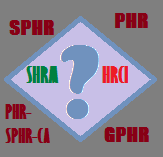Win or Lose: New sHRm Experience and Competency Modeling
How much experience counts? To what extent does experience count?
 It
is interesting to apprehend the definition of "experience"as defined
by some HR recruiters or managers, and actually see its translation in levels of competency. Experience level could so often erroneously be evaluated by the numbers
of years in the field of HR. Easy to do, right? It also sounds logical. How else would you measure experience? It's like cheese, better aged! How about going for the crazy ones?
It
is interesting to apprehend the definition of "experience"as defined
by some HR recruiters or managers, and actually see its translation in levels of competency. Experience level could so often erroneously be evaluated by the numbers
of years in the field of HR. Easy to do, right? It also sounds logical. How else would you measure experience? It's like cheese, better aged! How about going for the crazy ones?
There goes the new....
So, experience? Too little? Too much? Hiring managers, step back! Job candidates, take a deep breath! Regardless of where you practiced in the world: India, China, Mexico, The United Arab Emirats, Nigeria, the US, Brazil Bahrain, or the UK, going forward, the following competencies would be more relevant per a 2012 SHRM research results.
Some job candidates have heard it all. What is then for them to think or do? Maybe put into practice the famous advice of Amy Cuddy..."No, not enough experience". Or again, "Too much experience for this position"
© 2014 AR_HRCom-CertModel
Fake It Until You Know It!
SHRM to Create New Certification Based on HR Competencies
- See more at: http://www.shrm.org/Publications/HRNews/Pages/SHRM-Certification.aspx#sthash.KBD3aDyD.dpuf
SHRM to Create New Certification Based on HR Competencies
- See more at: http://www.shrm.org/Publications/HRNews/Pages/SHRM-Certification.aspx#sthash.KBD3aDyD.dpuf
SHRM to Create New Certification Based on HR Competencies
- See more at: http://www.shrm.org/Publications/HRNews/Pages/SHRM-Certification.aspx#sthash.KBD3aDyD.dpuf
That is to say, does a twenty-year veteran
in HR administration who has held the same position during her career, or a specialist
in a large organization who routinely applies corporate guidelines
demonstrate the same level of competency as a five-year-long tenure
practitioner who aligns HR policy with business goals, or again a similar
practitioner who translates policies into program implementation? Is a HR partner who has been executing mid-level corporate guidelines of a very large company without personal input for four years the equivalent of the two-year VP of HR in an organization of 500? How
much experience is enough experience? One can argue that perception is reality. We all would agree that one has to
compare apples to apples. Compare the types and sizes of organizations,
their market positioning, and the like.
SHRM to Create New Certification Based on HR Competencies
- See more at: http://www.shrm.org/Publications/HRNews/Pages/SHRM-Certification.aspx#sthash.KBD3aDyD.dpuf
There goes the new....
...Tailored, HR Competency Model
Interesting
enough, whether you choose to "Fake it until you Know it" or not, the
upcomig new HR competency model lies on nine core competencies, one
being technical and eight behavioral. So, yes, experience and knowledge
are relevant. However as relevant if not more crucially pertinent is the adequate
behavior. Different levels of HR practice call for different behavioral competencies and different levels of proficiency.
Some
things are certain to come with the new face of certification. The
basic competency remains technical. It is your expertise level. Without
that basic knowledge you would not be able to translate HR into business
applications. This later ability is the key to being a successful HR professional.
In other words, the behavioral competencies are the reflection of each HR professional. All HR might be created equal but they also grow at different paces. Is that personality or competency, or both?So, experience? Too little? Too much? Hiring managers, step back! Job candidates, take a deep breath! Regardless of where you practiced in the world: India, China, Mexico, The United Arab Emirats, Nigeria, the US, Brazil Bahrain, or the UK, going forward, the following competencies would be more relevant per a 2012 SHRM research results.
- HR Expertise
- Leadership and Navigation
- Critical Evaluation
- Communication
Intriguingly enough however, Europe and Northern countries, including Canada have been omitted from the pool of 33,500 surveyed professionals. Those countries might have an equivalent to SHRM, but they are still part of the global world, for which the SHRM certification is being designed. Concurrently, HRCI has issued a statement reassuring certified HR professionals that it still stands to reason that HRCI-provided certifications will hold their relevancy in the global, professional world of HR.
Like in all races, not everyone gets to the finish line at the same time. It should never be a race against others. It is your own criteria that should matter to you...in relativity to professionally, globally recognized standards.
Like in all races, not everyone gets to the finish line at the same time. It should never be a race against others. It is your own criteria that should matter to you...in relativity to professionally, globally recognized standards.
En Synthèse...
En Synthèse...
Divorce entre SHRM et HRCI?
Les
résultats d'une enquête menée par SHRM auprès de 33.500 professionnels
en RH originaires de 33 pays et 29 villes a été validée par 111 focus
groups de 1.200 professionnels. Ces groupes représentent le Bahreïn, le
Brésil, la Chine, l'Inde, le Mexico, le Nigeria, Les Emirats Arabes, Le
UK, et les USA. Grands omis? L'Europe et les pays Nordiques y compris le
Canada.
Toujours est-il que le résultat est un nouveau modèle d’évaluation des compétences des professionnels RH. Tout n'est pas de savoir la matière, encore faut-il savoir interpréter l'application sur le terrain. Franchement, c'est la que le bât blesse beaucoup de professionnels RH ou pas.
Ceci est un effort immense pour unifier les mesures de compétences RH de façon équitable et globale. Il n’empêche que les professionnels RH d'Europe sont souvent taxés de sous-qualification, compte tenu de la différence de contexte législatif, politique, culturel, et du business. Ce n'est certainement pas à juste titre, malheureusement. Doit-on alors s’étonner que certains étrangers venant implanter leurs businesses en Europe veuillent inculquer leur business cultures (ok, peut-être justifiable mais pas justifié) et importer leur législation du travail! J'avais scoopé deux articles respectifs sur les horaires de Sephora et le contrôle de l'utilisation des mobiles hors du temps de travail régulier.
| |







Comments
Post a Comment